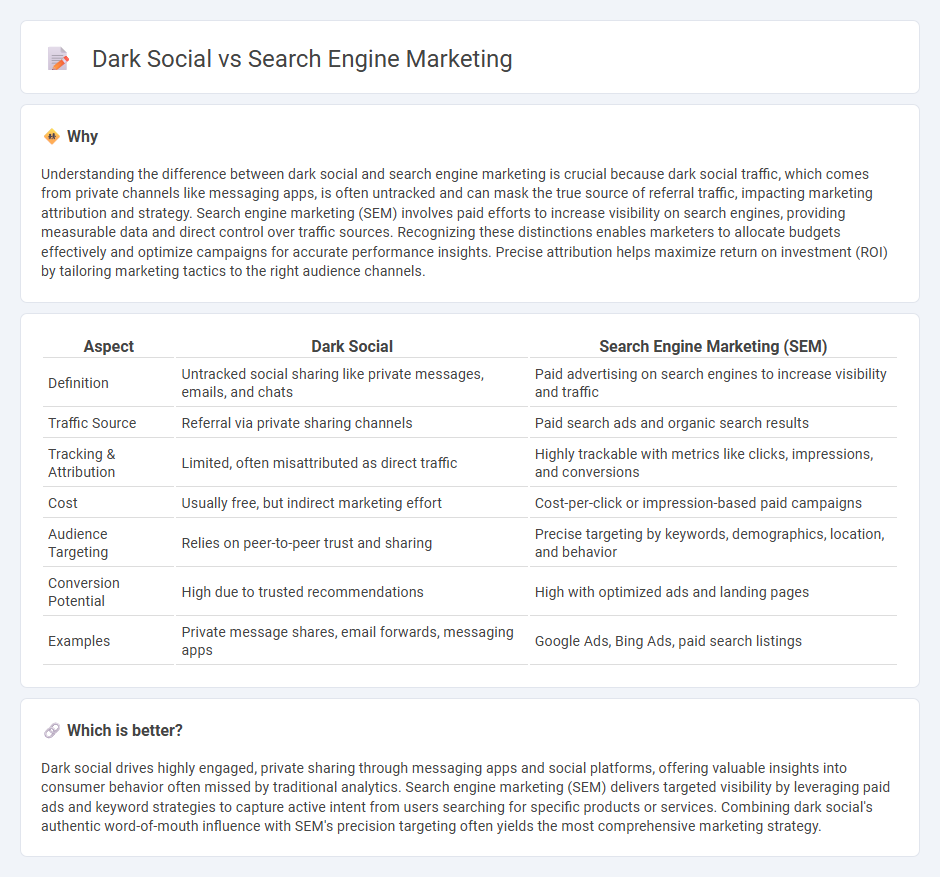
Dark social refers to the sharing of content through private channels like messaging apps, email, and encrypted platforms, making it difficult for marketers to track and analyze user engagement. Search engine marketing (SEM) involves the strategic use of paid advertisements and SEO to increase visibility and drive traffic from search engine results pages. Explore the unique challenges and opportunities each marketing approach offers to optimize your digital strategy.
Why it is important
Understanding the difference between dark social and search engine marketing is crucial because dark social traffic, which comes from private channels like messaging apps, is often untracked and can mask the true source of referral traffic, impacting marketing attribution and strategy. Search engine marketing (SEM) involves paid efforts to increase visibility on search engines, providing measurable data and direct control over traffic sources. Recognizing these distinctions enables marketers to allocate budgets effectively and optimize campaigns for accurate performance insights. Precise attribution helps maximize return on investment (ROI) by tailoring marketing tactics to the right audience channels.
Comparison Table
| Aspect | Dark Social | Search Engine Marketing (SEM) |
|---|---|---|
| Definition | Untracked social sharing like private messages, emails, and chats | Paid advertising on search engines to increase visibility and traffic |
| Traffic Source | Referral via private sharing channels | Paid search ads and organic search results |
| Tracking & Attribution | Limited, often misattributed as direct traffic | Highly trackable with metrics like clicks, impressions, and conversions |
| Cost | Usually free, but indirect marketing effort | Cost-per-click or impression-based paid campaigns |
| Audience Targeting | Relies on peer-to-peer trust and sharing | Precise targeting by keywords, demographics, location, and behavior |
| Conversion Potential | High due to trusted recommendations | High with optimized ads and landing pages |
| Examples | Private message shares, email forwards, messaging apps | Google Ads, Bing Ads, paid search listings |
Which is better?
Dark social drives highly engaged, private sharing through messaging apps and social platforms, offering valuable insights into consumer behavior often missed by traditional analytics. Search engine marketing (SEM) delivers targeted visibility by leveraging paid ads and keyword strategies to capture active intent from users searching for specific products or services. Combining dark social's authentic word-of-mouth influence with SEM's precision targeting often yields the most comprehensive marketing strategy.
Connection
Dark social channels such as private messaging apps and email significantly affect search engine marketing (SEM) by driving untracked referral traffic that can obscure accurate attribution in analytics. Understanding the interplay between dark social sharing and SEM enables marketers to refine keyword strategies and enhance campaign targeting based on more comprehensive user behavior data. Incorporating dark social insights improves the precision of conversion tracking and the overall effectiveness of paid search advertising campaigns.
Key Terms
**Search Engine Marketing:**
Search Engine Marketing (SEM) leverages paid advertisements on search engines like Google and Bing to increase website visibility and drive targeted traffic based on user intent and keywords. SEM campaigns use Pay-Per-Click (PPC) models to bid on search terms, optimizing ad placements for maximum ROI and measurable conversion rates. Explore the benefits and strategies of SEM to enhance your digital marketing efforts and outperform competitors.
Pay-Per-Click (PPC)
Pay-Per-Click (PPC) in search engine marketing targets visible user intent through ads on platforms like Google Ads, driving immediate, trackable traffic based on keyword bids and competition metrics. Dark social refers to traffic from private channels such as messaging apps and email, where PPC cannot directly measure user engagement, making attribution and optimization challenging. Explore effective strategies to integrate PPC with dark social insights for maximizing digital marketing ROI.
Keyword Bidding
Keyword bidding in search engine marketing (SEM) involves strategically purchasing keywords to improve ad placement and visibility on search engines like Google. Dark social refers to the sharing of content through private channels like messaging apps and email, where tracking keyword effectiveness is challenging due to lack of referral data. Explore how keyword bidding impacts SEM campaigns and discover ways to measure dark social influence for a comprehensive marketing strategy.
Source and External Links
What is search engine marketing (SEM)? - Optimizely - Search engine marketing (SEM) is a digital marketing strategy primarily focused on paid search advertising to increase a website's visibility in search engine results pages (SERPs), offering immediate results and an efficient way to drive targeted traffic by paying only for visitor-generating impressions.
The Importance of Search Engine Marketing in Digital Marketing - SEM involves using paid ads and optimization techniques on search engines like Google and Bing to enhance product or service visibility, playing a crucial role in driving targeted traffic, increasing sales, generating leads, and boosting brand awareness within integrated digital marketing strategies.
What Is SEM? The Definitive Guide to Search Engine Marketing - Search engine marketing includes paid and unpaid tactics, leveraging keywords to match user search intent with relevant ads and content to improve visibility, attract more traffic, and ultimately grow business revenue.
 dowidth.com
dowidth.com